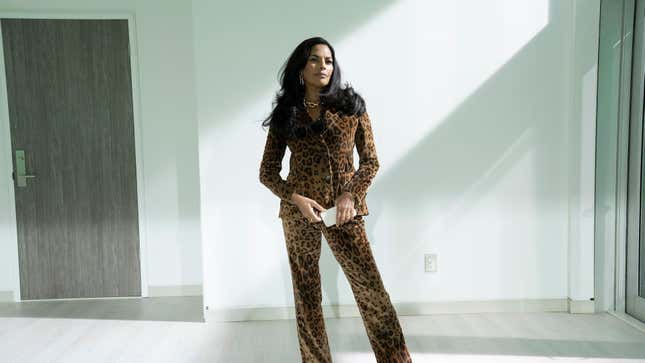
HBO Max’s And Just Like That… is a strained revival of HBO’s Sex And The City. The series is less a dramedy in its own right, and is instead a transparent, cringe-inducing endeavor to rectify SATC’s overt whiteness. It dares to ask, What would Carrie Bradshaw (Sarah Jessica Parker), Charlotte York Goldenblatt (Kristin Davis), and Miranda Hobbes (Cynthia Nixon) navigating New York City in their 50s look like if they finally befriended a diverse crowd?
To that end, AJLT adds several ancillary characters who are people of color, using them to usher in the leading ladies’ “woke” era. Charlotte struggles to maintain a bond with her first Black friend, popular school mom Lisa Todd Wexley (Nicole Ari Parker), which seems on par with her persona. Miranda initially fumbles with her young Black law school professor, Nya Wallace (Karen Pittman), and later falls for nonbinary podcast host Che Diaz (Sara Ramirez), cheating on her husband, Steve (David Eisenberg), with them. Carrie, meanwhile, finds a new pal in her confident real-estate agent, Seema Patel (Sarita Choudhury), who breezes into AJLT in episode four, “Some Of My Best Friends.”
From openly chatting about using dating apps to being unapologetically opinionated, Seema brings fresh energy to the show and Carrie’s life. A stalwart performer known for dramatic roles in Mississippi Masala, Homeland, and Jessica Jones, Choudhury crackles onscreen. She’s the show’s fiercest new addition, but AJLT vastly underuses her, as her arc is overshadowed by Carrie’s problems.
Before the season’s halfway point, Carrie loses three constants in her life. Her BFF, Samantha Jones (Kim Cattrall, who chose not to reprise her role), moves to London after they have a falling out; her husband, Mr. Big (Chris Noth), dies of a heart attack; and she unexpectedly bids adieu to long-time friend Stanford Blatch, who was (quite poorly) written out after actor Willie Garson’s death last September. Seema is meant to fill all those shoes—especially the big ones left by Samantha.

Cattrall is irreplaceable in the SATC universe. The actor’s influential portrayal of the fearless Samantha over six seasons and two movies is unforgettable, and her absence is sorely felt in AJLT. But Seema (and Choudhury) has risen to the occasion: Her evocative personality, instant connection with Carrie, and ability to speak her mind are reminiscent of the publicist extraordinaire. Seema is also a workaholic who impeccably styles herself in bold suits or color blocking. As a cigar aficionado who picks Carrie up in limousines, and a fashionista fawning over her friend’s closet, she steps into the voids left by Mr. Big and Stanford, respectively, too.
Seema is often tasked with pushing Carrie out of her comfort zone, whether it means taking her to a Diwali celebration, or helping her find a new apartment. While it’s commendable that the writers’ room includes Indian American Rachna Fruchbom, the show hardly fleshes out Seema’s backstory. When it does center Seema, AJLT sticks to tedious clichés: It’s 2022, do we really need to see another Indian woman on TV—in her mid-50s, no less—avoiding the arranged marriage conversation with her parents (played here by veteran actors Madhur Jaffrey and Ajay Mehta)?
In episode six, “Diwali,” Seema takes Carrie shopping for saris, only for her to end up wearing a lehenga to her holiday party. The choice sparked online furor for getting the nuances of traditional Indianwear wrong. Despite the episode’s title, the Diwali festivities get maybe only five minutes of screen time. This isn’t shocking, because it’s clear that, despite its intention to give Carrie, Charlotte, and Miranda greater social awareness, AJLT is still written for a white audience.

SATC pushed boundaries when it premiered in 1998 with its stories about love and sex, albeit tackled through a mostly one-sided perspective. Some of the original show’s ideas are obviously dated, such as Carrie’s dismissal of bisexuality, or how the four leads barely interacted with any people of color, despite living in New York City. The only characters of color who had multi-episode arcs were Maria Reyes (Sônia Braga), Samantha’s girlfriend from season four who quickly fell under the “fiery Latina” stereotype, and Miranda’s boyfriend from season five, Dr. Robert Leeds (Blair Underwood).
Intended as a course correction, the revival tries hard but largely fails to unpack modern-day dating, or provide more social commentary than before. The burden falls on Seema, Nya, and even the divisive Che to cope with the leads’ fragility. The result is awkward and insufficient.
Seema educating Carrie on the basics of Diwali or Miranda’s interactions with Nya (she’s afraid of saying offensive things, forgetting she’s an astute lawyer who made partner at her firm) seem inauthentic. Are we expected to believe that Carrie, a nationally acclaimed author working with Vogue, has never heard of the Hindu festival? Or, as a lover of fashion, is gawking at luxurious saris for the first time?
The show has its brief impactful moments—like Charlotte questioning Miranda’s cheating, or Carrie’s genuine attempts to move on as a widow—but it mostly squanders the opportunity to reflect on its legacy and evolve. It’s simply not enough to be inclusive for the sake of checking off a box anymore. Rather than tapping into Choudhury’s acting prowess to explore an older South Asian woman, who actually seems to be quite the renegade, AJLT sadly but unsurprisingly sticks to stereotypes and keeps her on the periphery.